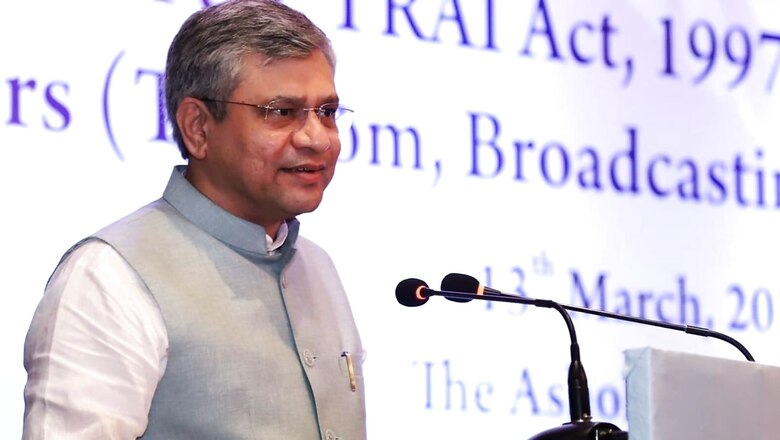
views
The Ministry of Railways will work with the Indian Institute of Technology (IIT), Madras to develop an “indigenous” hyperloop system.
It is also believed the ministry will help establish a Centre of Excellence for Hyperloop Technologies at the premier institute.
In a tweet, the ministry confirmed that the Indian Railways has teamed up with the institution to develop a hyperloop-based transit system to usher in a new era of transportation. It was also stated that IIT Madras would receive Rs 8.34 crore in funding from the Indian Railways for this project, augmenting the ‘Make in India’ initiative and the ‘Aatmanirbhar Bharat’ scheme.
Apart from the financial support, the Indian Railways will also help in manufacturing, formulation of safety regulations and provide assistance to access electrical testing facilities of the railways.
In case of IIT Madras, it is expected to deliver design documentation for pod, tube and track. Additionally, the institution will also be responsible for testing and performance data delivery for the pod prototype and the vacuum tube.
Similarly, IIT Madras will also provide training to the railway personnel. hyperloop tracks for the development of pod technology are also included under the responsibilities of the institution.
The Technology
This is a new type of transport technology and many companies around the world are currently working on it.
Between hyperloop and standard rail, there are two major differences such as the passenger pods travel via tubes or tunnels that have had most of the air removed to reduce friction. The pods should be able to travel at speeds of up to 750 miles per hour.
Secondly, instead of using wheels like a train or automobile, the pods are meant to float on air skis or use magnetic levitation to eliminate friction.
It is claimed to be faster and less expensive to construct than regular high-speed rail. As a result, the hyperloop might be utilised to relieve congestion on congested roadways, facilitating transit between cities and potentially yielding significant economic benefits.
The idea of using low-pressure or vacuum tubes for transportation is not a new idea. But Tesla CEO Elon Musk rekindled interest in this concept when he published his ‘Hyperloop Alpha’ paper in August 2013, outlining how a modern system would work and how much it would cost.
Then in 2020, the US-based company Virgin Hyperloop claimed that it has successfully tested its ultra-fast transportation system with human passengers for the first time.
A New Transport System in India
In 2017, then Railway Minister Suresh Prabhu expressed interest in hyperloop technology, saying that India would be closely watching the project. Since then, several rounds of talks between the ministry and America’s Hyperloop One have taken place, but nothing concrete has emerged.
However, according to a statement from the railways ministry, hyperloop mode of transportation is appealing to Indian Railways because of its low energy requirements and the substantial role it may play in making India carbon neutral.
The statement added that the ministry had been looking for appropriate partners and domain specialists to collaborate with on the creation of this new and evolving idea for passenger and cargo transportation.
“The Ministry of Railways was informed that a team comprising 70 students, named ‘Avishkar Hyperloop’, formed by IIT Madras in 2017, has been applying scalability and frugal engineering concepts for the development of Hyperloop based transportation system with an aim is to make India proud by showcasing its technologies to the world,” the statement further added.
To usher into a new era of transportation, Indian Railways has come together with @iitmadras to develop a hyperloop technology based transportation system.Indian Railways will extend financial support of Rs. 8.34 cr to IIT Madras for this project. pic.twitter.com/xUoMyxj9QU— Ministry of Railways (@RailMinIndia) May 20, 2022
This group was the only Asian team to place in the top 10 worldwide at the SpaceX Hyperloop Pod Competition-2019. At the European Hyperloop Week-2021, ‘Avishkar Hyperloop’ won the Most Scalable Design award.
This year in March, IIT Madras addressed the railways ministry with a proposal for joint construction of a contactless pod prototype and a first-of-its-kind Hyperloop Test Facility at its Discovery Campus. The facility is expected to provide the world’s largest Hyperloop Vacuum Tube, which could be used as a test-bed for Indian Railways’ Hyperloop research.
As of now, the objective is said to be the construction of a 500-meter tube (diameter 2 meters) and track capable of supporting multiple propulsion and levitation system combinations in order to accelerate pod technology research.
The tube will be functionally comparable to the facility of California’s Virgin Hyperloop but will be substantially cheaper, according to the Railways.
However, the institute has also proposed to build a Centre of Excellence for Hyperloop Technologies through its existing Centre of Railway Research (CRR) at IIT Madras which has been operational since 2017 with sponsorship from the Ministry of Railways.
Read all the Latest India News here




















Comments
0 comment